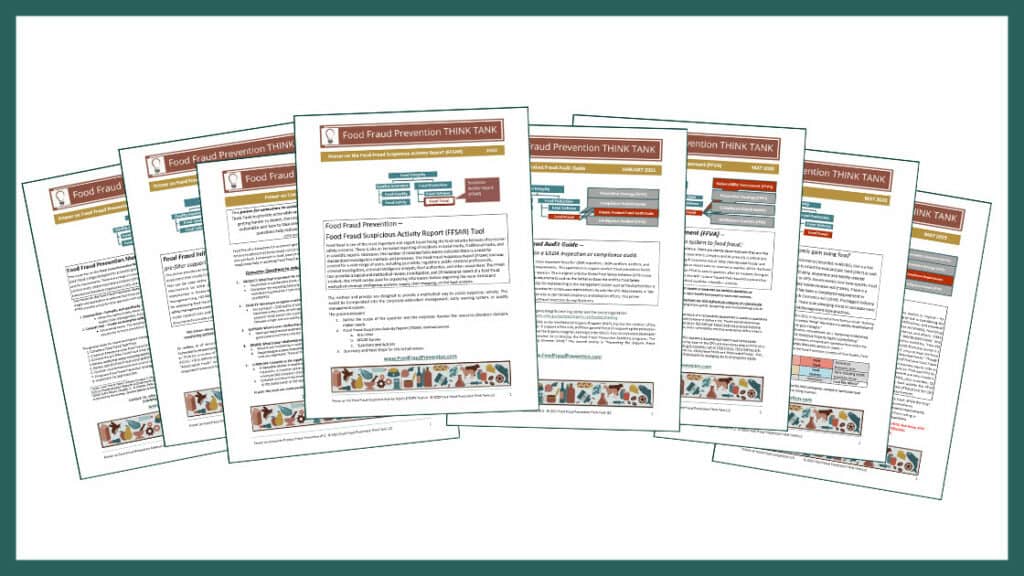This blog post reviews the free resources that address food fraud prevention hot topics. Our online library has many primer documents and more detailed insight reports. Topics include: FF Compliance Summary, FF Suspicious Activity Report Method, FF Initial Screening and Vulnerability Assessment guidance, and several overviews of Enterprise Risk Management (ERM/ COSO).
SHARE WIDELY: Please feel free to share the links with anyone or to post anywhere. These online resources were created to be easily shared with suppliers or interested parties.
The resources were created to help address some of the most important and most basic food fraud prevention questions. Sometimes the most straightforward questions – such as how to start, how much is enough, and what is the minimum compliance requirement – are the most difficult to answer directly.
Our Food Fraud Prevention Academy has an online library on the Resources web page. The types of resources include: Bookstore, Primers (brief background summaries), Glossary of Terms, Food Fraud Insight Reports (longer in-depth reviews of topics), Publications (list of scholarly and trade journal publications), Recommended Reading, and Video Library (a curated list of webinars, lectures, and training that are posted publicly on YouTube).
Primers
Primers are short background summaries of key topics. Resources include:
- Primer: Food Fraud Prevention
- This is a two-page overview of the entire food fraud topic, including compliance requirements and the focus on prevention. This is the best starting point for reviews.
- Primer: Food Fraud Prevention Method (FFPM)
- This is a one-page overview of the steps to create and implement a food fraud vulnerability assessment and food fraud prevention strategy (e.g., VACCP).
- Primer: Food Fraud Compliance
- This is a three-page overview of the compliance requirements, including an in-depth table of US food laws and regulations.
- Primer: Food Fraud Vulnerability Assessment (FFVA)
- This is a two-page overview of the strategy and hierarchy for FFVA compliance. The risk tolerance is defined by an Enterprise Risk Management (ERM/ COSO) process.
- Primer: Food Fraud Initial Screening (FFIS) Model
- This is a five-page overview of the ‘initial screening’ or ‘pre-filter’ that is the preliminary step before conducting a more detailed Food Fraud Vulnerability Assessment.
- Primer: Organic Product Fraud Audit Guide
- This is a two-page supplement to the USDA National Organic Program training. This presents twenty questions for an organic product fraud audit or inspection.
- Primer: Consumer Product Fraud Prevention
- This is a one-page set of five questions consumers can ask to understand their product fraud vulnerability. This is a starting point for consumers and the public.
- Primer: Food Fraud Suspicious Activity Report (FFSAR)
- This is a four-page introduction to the Food Fraud Suspicious Report (FFSAR) tool created for a wide range of users, including journalists, regulators, public relations professionals, criminal investigators, criminal intelligence analysts, food authorities, and other researchers.
Food Fraud Insight Reports (FFIR)
The Food Fraud Insight Reports (FFIR) format is longer and provides more research or details on a topic. Resources include:
US Food Laws/ Food Safety Modernization Act Final Rules subjects:
- Review: Final Rule for FSMA Intentional Adulteration (Food Defense) Regarding Food Fraud and EMA
- Review: Final Rule for FSMA Produce Safety Rule (FSMA‐PS) Regarding Food Fraud and EMA
Global Food Safety Initiative (GFSI) subjects:
- Review of GFSI Food Fraud Technical Document: Tackling Food Fraud through Food Safety Management Systems
- Review: Review of the New GFSI Guidance Document Issue 7 Regarding Food Fraud
Risk Tolerance Level/ Enterprise Risk Management (ERM/ COSO) subjects:
- Applying Enterprise Risk Management to Food Fraud Prevention (ERM1)
- The Role of Enterprise Risk Management in Food Fraud Prevention (ERM2)
- Implementation and Best Practices for Enterprise Risk Management for Food Fraud Prevention with Survey (ERM3) (Forthcoming)
International Standards Development for ISO and Codex Alimentarius (CODEX)
- Comments to the US Codex Delegation for the Food Fraud EWG Discussion Document Draft from August 5, 2022
- A Review of ISO Standards Terminology Regarding Product Integrity and Authenticity
- The Risk of Document Fraud in the Food Supply Chain: Preliminary Findings from the Food Document Fraud Survey
Takeaway Points
- Take a quick look at the food fraud resources to learn and understand what is available to share with suppliers or other employees.
- You can refer to these resources when developing your food fraud prevention supplier requirements.
- You can use these resources in training plans when developing training plans for your new or promoted employees.

